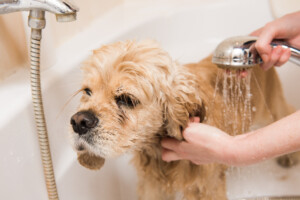What’s holding you back from getting your child a puppy?
Is it REALLY because you think YOU’LL end up caring for it?
There’s actually another reason, and you probably know what it is.
“But Mama, why can’t I have a puppy?”
“Because I’m the one who’ll end up taking care of it. The answer is no!”
Your Child Is Begging for a Puppy. You Don’t Want to Do All the Work.
“I feel that the majority of the time a parent says this is when they do not want a pet themselves,” says Dr. Tia Kern-Butler, a licensed psychologist for over 20 years who treats a broad range of issues including relationship problems and behavioral issues of children and adolescents.
“And this excuse is exactly that…a convenient excuse. Parents know they’re going to have the majority of the responsibility.”
To the parent, this should be a no-brainer. After all, what parent in his or her right mind could actually think that a 10-year-old is capable of being the primary caregiver to a dog? A hamster, maybe, but not a dog!
Some parents do get the dog yet still think the child should take on more of the responsibility than what is appropriate or feasible for that child’s age.
And in some cases, deep down, the parent may like the idea of a warm furry thing around the house to cuddle, but does not want the responsibility.
Can’t parents just be honest with their kids?
A parent may be unsure about having a pet, but if the parent truly wanted a dog, they would not be telling their child, “We’re not getting a dog because I’m the one who’s gonna end up cleaning the messes,” points out Dr. Kern-Butler.
“A parent who wants the pet, gets the pet,” says Dr. Kern-Butler. “It’s in the case where the child wants a pet — but the parent does not — that this presents a dilemma.”
If you don’t want a dog (don’t like them, think they smell, don’t want to hassle with fleas, barking, expenses), then just tell your child the truth: “I am not a dog person,” or whatever you think will work best.
Otherwise, by bringing up the concept of caretaking, you’ll prolong the issue and make it very enticing for the child (especially an older and feisty one) to repeatedly argue their case.
But if you flat-out admit that you don’t like dogs…your child will have little room for negotiation attempts.
How much should the parent take care of the puppy?

“I agree, no child is going to have 100% of the pet-care duties,” says Dr. Kern-Butler.
“If a parent wants their child to have the benefits of pet ownership, then a clear discussion about reasonable expectations should occur.
“A parent should use good judgement in the type of pet and care required in regard to the child’s age.
“For example, a hamster is easier for a younger child to care for than a dog. And if a parent is absolutely against caring for the pet themselves, they should not get the pet.
“Yes, it’s sad that the child misses out on the benefits of pet ownership, but it’s in the animal’s best interest in this case.”
What about parents on the fence?
As previously mentioned, there may be some parents who wouldn’t mind having a dog, but the idea of caring for it is daunting.
A dog provides unconditional love to a child – in that unlike the child’s siblings and even parents, an animal will not criticize or judge.

A dog will also teach kids responsibility — even if the pet related chores are only 10 percent of what the parent must do. Ten percent to a 10-year-old is definitely enough to ingrain responsibility.
So if you’re on the fence about dog ownership, you’ll want to consider the aforementioned points.
Kids can always share in the caretaking. For instance, a seven-year-old shouldn’t be walking the dog without supervision, but a seven-year-old is capable of giving it playtime and pouring water into a bowl (at your command).
If your teen wants a puppy, the amount of responsibility goes up, but the parent needs to accept the fact that a teen may not always clean up “accidents” or remember to walk the animal.
Parent Taking Care of the Dog
Once you’ve come to terms with this reality, it won’t be so aggravating when your child forgets to fill the bowl or frets when it’s time to walk the dog.
An example of delegating the caretaking would be that of assigning one daily task to the child such as keeping the water bowl full, or letting the dog out every morning (if the yard is enclosed) to romp around and do its business and then remembering to let the dog back in after a set time range.
You can also dictate more sporadic responsibilities such as giving the dog a bath or grooming it.
Daily tasks, however, cannot be dumped entirely on a juvenile.
Bringing a puppy or dog into the household means you’ll be taking on an additional family member.
A child should not be expected to take 100 percent care of this new family member any more than if this new family member were a human.


 Currently in private practice Dr. Kern-Butler spent 10 years as the lead child and adolescent psychologist with Winter Haven Hospital and served as the mental health liaison for the Children’s Advocacy Center for 14 years.
Currently in private practice Dr. Kern-Butler spent 10 years as the lead child and adolescent psychologist with Winter Haven Hospital and served as the mental health liaison for the Children’s Advocacy Center for 14 years.







































